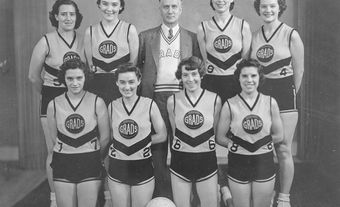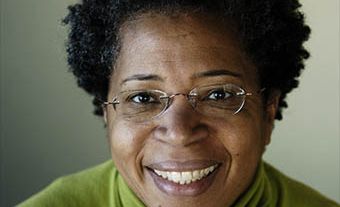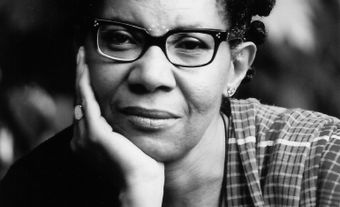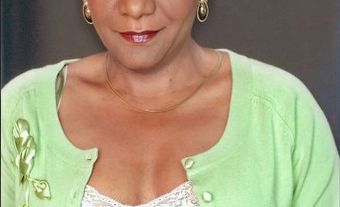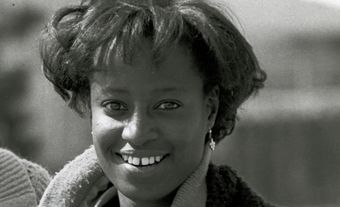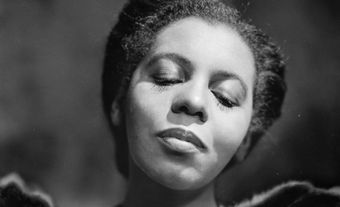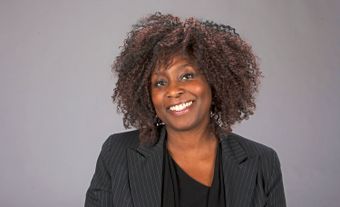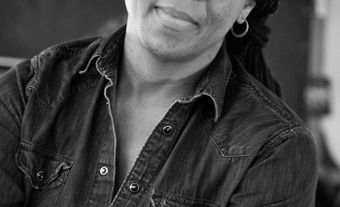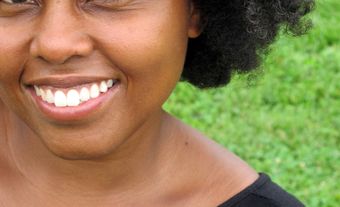The following article is part of an exhibit. Past exhibits are not updated.
Driven to overcome histories of prejudice and marginalization, as women and as people of African descent, Black women are among Canada’s most innovative artists. With their fingers on the pulse of this multi-tasking, multi-disciplinary, 21st-century culture, the 15 dynamic artists featured in this exhibit — a mix of poets, playwrights, filmmakers, musicians and visual artists — refuse to be limited to one medium or style.
Award-winning poet Dionne Brand is also a novelist, filmmaker and influential professor, while Lillian Allen thrives as a dub poet, declaiming her verses to reggae accompaniment. trey anthony is a comedian as well as a ground-breaking playwright and screenwriter. All of these women and the many others below are also, in one way or another, passionate activists and committed advocates who are deeply involved in their communities.
Literature
Dionne Brand
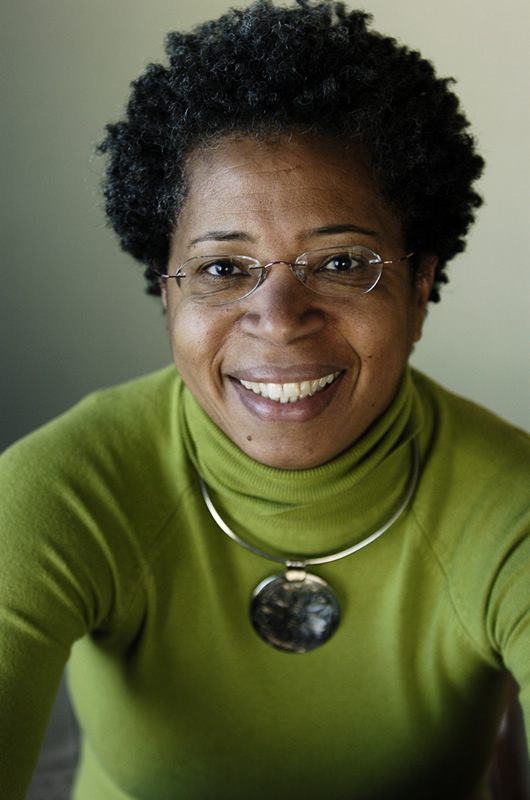
Dionne Brand, poet, writer, filmmaker, educator and activist (born 7 January 1953 in Guayaguayare, Trinidad).
Winner of the Governor General’s Award and the Griffin Poetry Prize, and former Poet Laureate of Toronto, Dionne Brand is considered one of Canada's most accomplished poetic voices. She has published poetry, fiction, essays and other writings, in addition to teaching literature, creative writing and women's studies at various universities in Canada and the United States. She is also an influential human rights activist.
Brand’s poetry is characterized by formal and linguistic experimentation in her endeavour to articulate with honesty and passion the experience of an immigrant woman of colour in Canada. In her well-known long poem "No Language Is Neutral" (1990), Brand meditates on her "escape" from Trinidad to Canada, where language can be just as enslaving and where her history is just as obscured by the typically white, male and heterosexual master narratives of others: "History will only hear you if you give birth to a / woman who smoothes starched linen in the wardrobe / drawer," she writes, "and who gives birth to a woman who is a / poet, and, even then." (See also What We All Long For.)
M. NourbeSe Philip

Marlene Nourbese Philip, poet, novelist, essayist (born 3 February 1947 in Moriah, Tobago).
Marlene Nourbese Philip, who publishes under the name M. NourbeSe Philip, is the influential author of novels, stories, essays and plays concerning the politics of gender, race and language. One of the central themes of Philip's work is an attempt to document her ongoing struggles to connect with her lost cultural heritage.
Her first book of poetry, Thorns, was published in 1980, followed by Salmon Courage in 1983. Her third collection, She Tries her Tongue, Her Silence Softly Breaks, was published in 1989 and received the Casa de las Américas prize. Philip was the second Canadian ever to receive the award. In She Tries Her Tongue, Her Silence Softy Breaks, the problem of speaking and writing in English, a "foreign lan lan lang / language," is foregrounded — the poems are a linguistic quest for a pure utterance that can express personal memory and authentic experience.
Lillian Allen
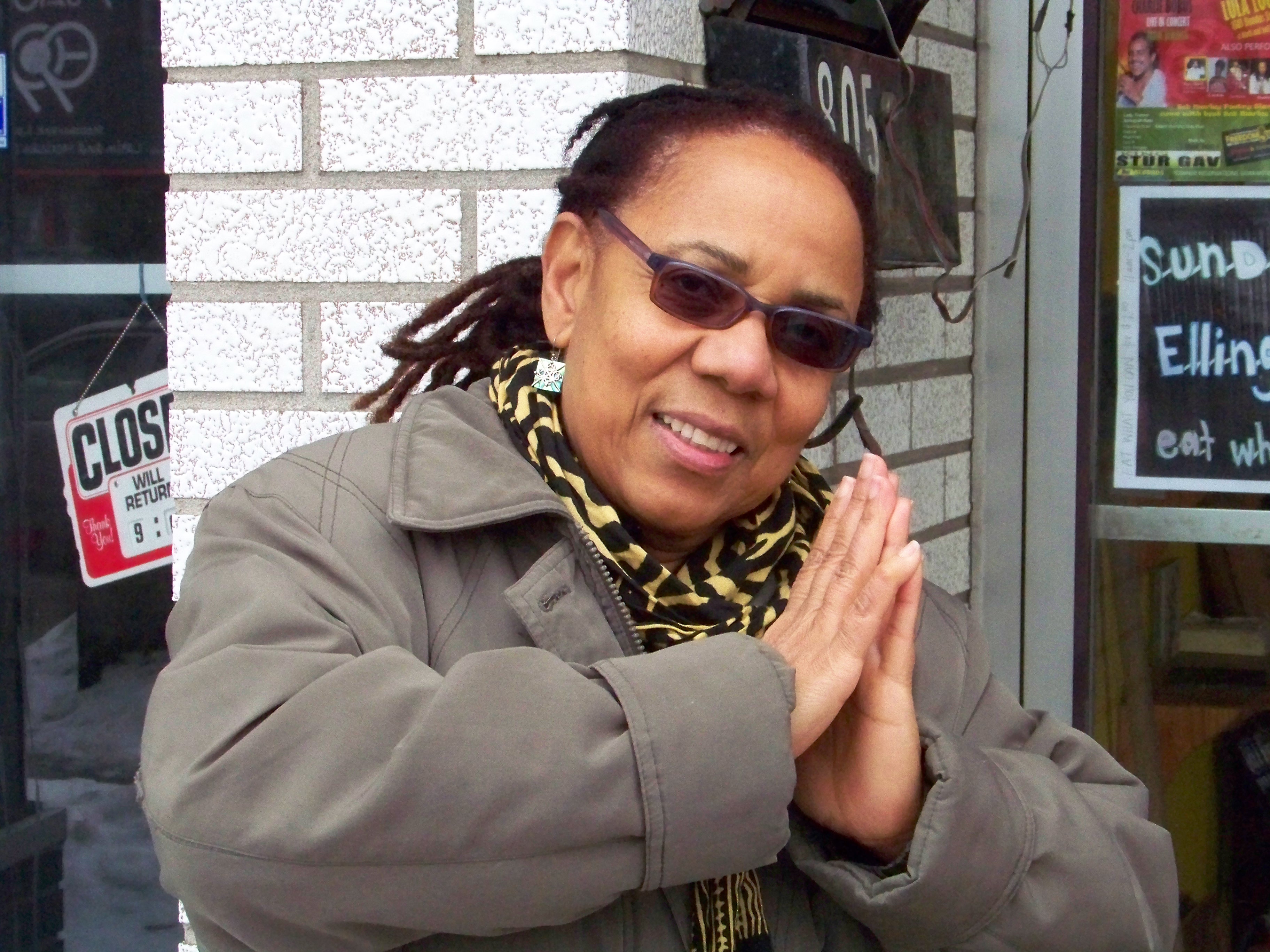
Lillian Allen, poet, vocalist, lyricist, community activist, teacher (born 5 April 1951 in Kingston, Jamaica).
Lillian Allen is Canada's foremost dub poet, performing verses on social and political issues in a rhythmic, declamatory vocal style to reggae accompaniment. She has appeared at literary, music and feminist festivals and events in Canada, the US, the Caribbean, England and Europe, and was heard at Expo 86.
In 1989, Allen’s poem “Unnatural Causes” was the subject of a National Film Board of Canada short film. It features images of politicians basking in luxury and comfort interspersed with images of homeless women and archival footage of Canadian protest movements. In 1993, Allen co-produced and co-directed the documentary Blak Wi Blakk, about the life and work of the dub poet Mutabaruka. In 1999, she released her third album, Freedom and Dance.
Allen was a driving force in the 2003 founding of the Dub Poets Collective, alongside Afua Cooper, Klyde Broox, Chet Singh, Clifton Joseph, d’bi.young anitafrika and Sankofa Juba. In 2004, she hosted Wordbeat, a CBC Radio program on poetry and spoken word.
Theatre
Lorena Gale

Lorena Gale, actor, playwright, activist (born 9 May 1958 in Montréal, QC; died 21 June 2009 in Vancouver, BC).
Lorna Gale achieved a strong and varied body of work in Canadian theatre, but she was perhaps best known for her role as the high priestess Elosha in the television series Battlestar Galactica (2004–08).
Activism was a lived experience for Gale; she spoke out, promoted Black causes and displayed her concerns for the Black community through her plays, such as Angélique, about a Black slave hanged in Montréal for arson in 1734 (see Marie-Joseph Angélique). The play won the 1995 du Maurier National Playwriting Competition and was staged Off-Broadway in 1999.
Je me souviens, her one-woman show about growing up Black in the rich Montréal suburb of Outremont, was a searing yet funny attack on White attitudes in French-speaking Montréal and was a finalist for the 2002 Governor General's Literary Award for Drama.
What Colour is Black: Art, Politics and Racial Identity premiered as part of a multidisciplinary performance series at the Grunt Gallery in Vancouver in 1995. Her last play, The Voice, a monologue about faith and the power of self-reliance, was staged in 2008.
trey anthony

trey anthony, comedian playwright, screenwriter, producer (born 1974 in London, England).
anthony’s first theatrical work, 'da Kink in my Hair, debuted at Toronto’s Fringe Festival in 2001. The play takes place in a beauty salon in a West Indian neighbourhood of Toronto, and features the hilarious and heartbreaking stories of the patrons. “If you want to know a Black woman, you touch her hair,” Novelette (who was played by anthony in the original production) tells the audience. “Cause our hair carries our journey.”
On opening night of 'da Kink in my Hair, anthony offered free tickets to all barbers and hairdressers, and the show went on to become one of the most successful plays ever to be produced at the Toronto Fringe Festival. In 2005, an expanded version of 'da Kink in My Hair became the first Canadian play produced by the Princess of Wales Theatre in Toronto.
'da Kink was made into a television series, which aired from 2007 to 2009 on Global TV. It was the first prime-time Canadian network television show to feature an entirely Black cast.
Film
Jennifer Hodge de Silva

Jennifer Hodge de Silva, née Hodge, documentary filmmaker (born 28 January 1951 in Montréal, QC; died 5 May 1989 in Montréal).
Jennifer Hodge de Silva was a pioneering African-Canadian filmmaker of the 1970s and 1980s. She produced an acclaimed and influential body of work known as realist social-issue documentary. Her highly regarded signature film Home Feeling: A Struggle for Community (1983) is widely taught in post-secondary film studies programs throughout Canada.
Home Feeling, explored the troubled relations between the Toronto Police Service and residents of the city's predominantly Black Jane–Finch district. The intense and complex portrayal of the overall situation, including the views of both the police and the residents, remains relevant. Home Feeling is recognized as a liberal realist documentary that gives a voice to an otherwise marginalized community.
Hodge de Silva’s sensitive yet uncompromising approach to documentary filmmaking presented complex social conditions through intimate explorations of personal experience. She was the first Black filmmaker to work consistently with both the NFB and the CBC. Her groundbreaking work provided a pathway for future filmmakers such as Clement Virgo, Sylvia Hamilton and Jennifer Holness.
Sylvia Hamilton
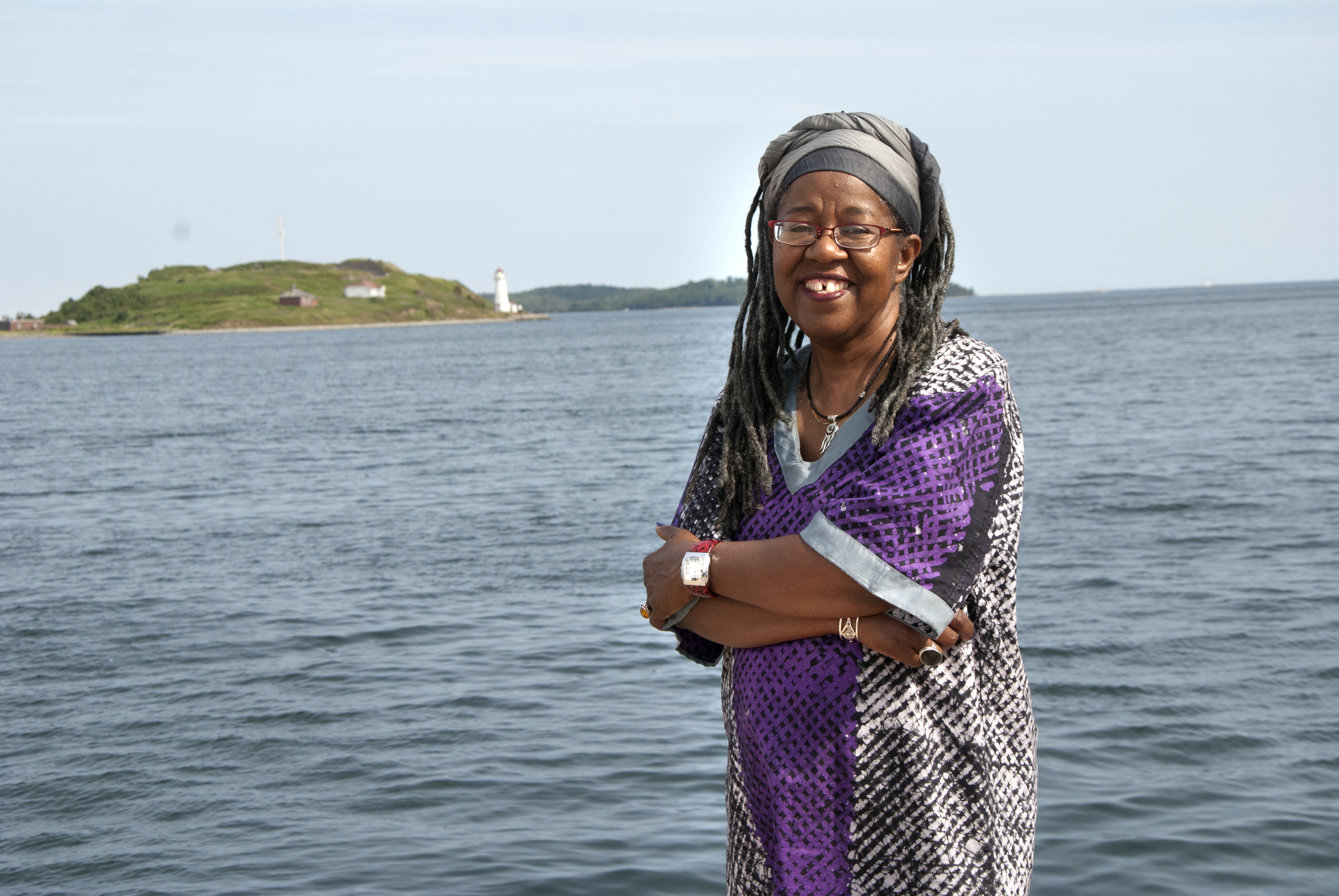
Sylvia D. Hamilton, filmmaker, writer, educator (born in Beechville, NS).
Sylvia Hamilton specializes in re-evaluating sanitized accounts of Canadian history and focusing on the perspectives of Black Canadians, particularly Black Canadian women. Her films include Black Mother Black Daughter (1989), the Gemini Award winner Speak It! From the Heart of Black Nova Scotia (1993), the biographical documentary Portia White : Think on Me (2000) and The Little Black Schoolhouse (2007). In both her essays and films, Hamilton draws on collective experiences to document diverse and inclusive communities, bringing to light what previous historians have overlooked.
Particularly significant is Hamilton’s essay, “Stories from The Little Black Schoolhouse.” The film visits historical remains that Hamilton calls “sites of memory.” She writes, “[T]here are generations of invisible stories embedded in these geographic sites and in the memories of the students, teachers, parents, and trustees who were the schools’ communities. The segregated schools were a direct legacy of the enslavement of Black peoples and the conscious and unconscious racist societal attitudes that are intertwined with that heinous system.”
Jennifer Holness

Jennifer Holness, producer, screenwriter, director (born 1969 in Montego Bay, Jamaica).
Jennifer Holness is the president and co-founder of Hungry Eyes Film & Television, which emphasizes stories that engage with social issues and a dynamic representation of Black Canadians. “For me,” she told the Toronto Star in 2012, “filmmaking is about telling stories that don’t often get told.” Her notable works include the award-winning Love, Sex, and Eating the Bones (2003), Home Again (2012) and the Gemini Award-winning miniseries Guns (2009).
Holness co-directed the NFB documentary Speakers for the Dead (2000) with her husband, Sudz Sutherland. The film examined a struggle to restore an African Canadian cemetery in Priceville, Ontario, and it displayed Holness’ commitment to challenging sanitized images of Canada. "I was raised in Canada, and I was acutely aware that my culture was not part of the historic context: that black history was just not being taught," she said in an interview during the film’s release. She has also asserted that “we can't be smug about Canada's place in history when it comes to racism."
Music
Portia White

Portia May White, contralto, teacher (born 24 June 1911 in Truro, NS; died 13 February 1968 in Toronto, ON).
Portia White broke through the colour barrier to become the first Black Canadian concert singer to win international acclaim. Considered one of the best classical singers of the 20th century, her voice was described by one critic as “a gift from heaven,” and she was often compared to the celebrated African American contralto Marian Anderson. White was named a “person of national historic significance” by the Government of Canada in 1995.
White did not make any studio recordings, but her voice can be heard in several concert recordings, including a song recital titled Think on Me (1968). Library and Archives Canada acquired from the White family audio recordings of her performances in New York and in Moncton, NB, in 1944 and 1945.
The Portia White Prize is awarded each year by the Nova Scotia Arts Council to an outstanding Nova Scotian in the arts. The inaugural recipient of the award in 1998 was her great-nephew, the writer George Elliott Clarke.
Jully Black

Jully Ann Inderia Gordon, singer, songwriter, actor, TV personality (born 8 November 1977 in Toronto, ON).
Known as Canada’s Queen of R&B, Jully Black is a Juno Award -winning R&B and soul singer-songwriter. In 2013, CBC Music named her one of the 25 Greatest Canadian Singers Ever. Her distinctively raspy alto voice has garnered comparisons to Tina Turner and Amy Winehouse. In addition to her musical accolades, Black starred in a Toronto production of trey anthony's play 'da Kink in my Hair. Her charismatic and engaging personality has also made her a popular host for various shows and events.
At 21, Black signed to Warner/Chappell Music Canada and went on to write songs for Destiny’s Child, Nas, Sean Paul, Missy Elliott and many other artists. Black’s sophomore album, Revival (2007), featured her best-selling single to date, “Seven Day Fool,” which peaked at No. 9 on Billboard’s Canadian Hot 100 chart. Revival was certified gold in Canada and won the trophy for R&B/Soul Recording of the Year at the 2008 Juno Awards. Black also champions a number of wide-ranging causes and has participated in numerous charitable events.
Jackie Richardson
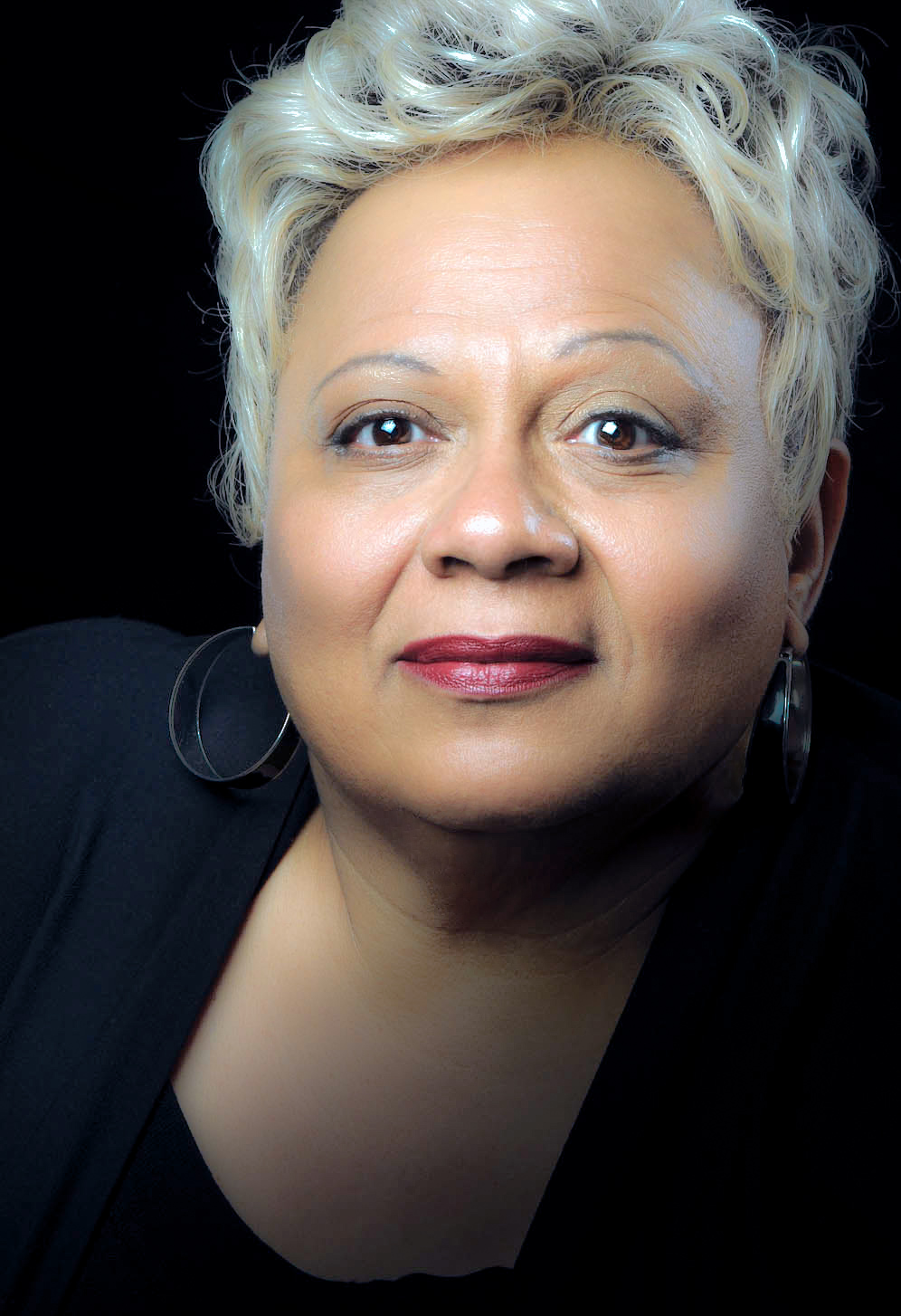
Jackie Richardson, actor, singer (born 1947 in Donora, Pennsylvania).
Jackie Richardson is an award-winning singer and actor whose career spans more than five decades. She has been called Canada’s reigning queen of jazz, blues and gospel, and has received a Maple Blues Award for lifetime achievement. She is also a Gemini Award and Dora Award-winning actor who has appeared in numerous musical theatre productions, films and television series. In 2014, the Toronto Star named Richardson one of 180 people who have helped shaped the city since it was founded.
Throughout her career, Richardson has sung on a number of high-profile recordings, including: Joe Sealy’s Juno Award-winning album Africville Suite (1996); Anne Murray’s What a Wonderful World: 26 Inspirational Classics (1999); Norm Amadio’s Norm Amadio and Friends (2009); Peter Appleyard’s 2012 recording “Georgia”; David Clayton-Thomas’ “Freedom for the Stallion” (2015); and Micah Barnes’ “New York Story Duet” (2016). She has also collaborated with numerous musicians on stage, including the Toronto Symphony Orchestra.
Visual Arts
Deanna Bowen

Deanna Bowen, visual artist (born 5 November 1969 in Oakland, California).
Bowen is a multidisciplinary artist whose work addresses African migration, personal and community histories, genealogy and the history of enslavement, often drawing on archival documents to create works that witness traumatic histories. Bowen’s work is widely shown throughout Canada, as well as in the United States and Europe.
Deanna Bowen is a descendant of the settlers of the Black communities of Amber Valley and Campsie, Alberta. (Her Alabama- and Kentucky-born grandparents fled the US after the establishment of Jim Crow legislation in the late 19th century). Her family history has been key to many of her works. During her childhood, Deanna often lived with her grandparents when her mother, who divided her time between Vancouver and Seattle, was away. The tension between racism in Canada and the US (and an inquiry into Canada’s denial of its own histories of antagonism towards Black immigrants) informs much of her work.
Sandra Brewster

Sandra Brewster, visual artist (born in 1973 in Toronto, ON).
Sandra Brewster is a multimedia artist working primarily in drawing, painting and mixed-media to explore questions of race, representation and memory. As an artist, educator and organizer, Brewster is an active presence in Toronto’s artistic community, and her work has been exhibited across Canada and internationally.
Much of Brewster’s early work drew on traditional portraiture. An investigation into the divide between self-representation and public perception of Black bodies informed the Cool series (1997–2000), which feature solemn, close-cropped faces rendered in charcoal, as well as the Stance series (2003). Based on photographs of African-Caribbeans who arrived in North America in the 1960s and 1970s, Brewster’s Stance drawings examine how a generation of immigrants represented themselves in a new country. These portraits were united by an interest in dismantling public perceptions of Black communities, and in drawing attention to the cultural diversity of the African diaspora in Canada.
Camille Turner
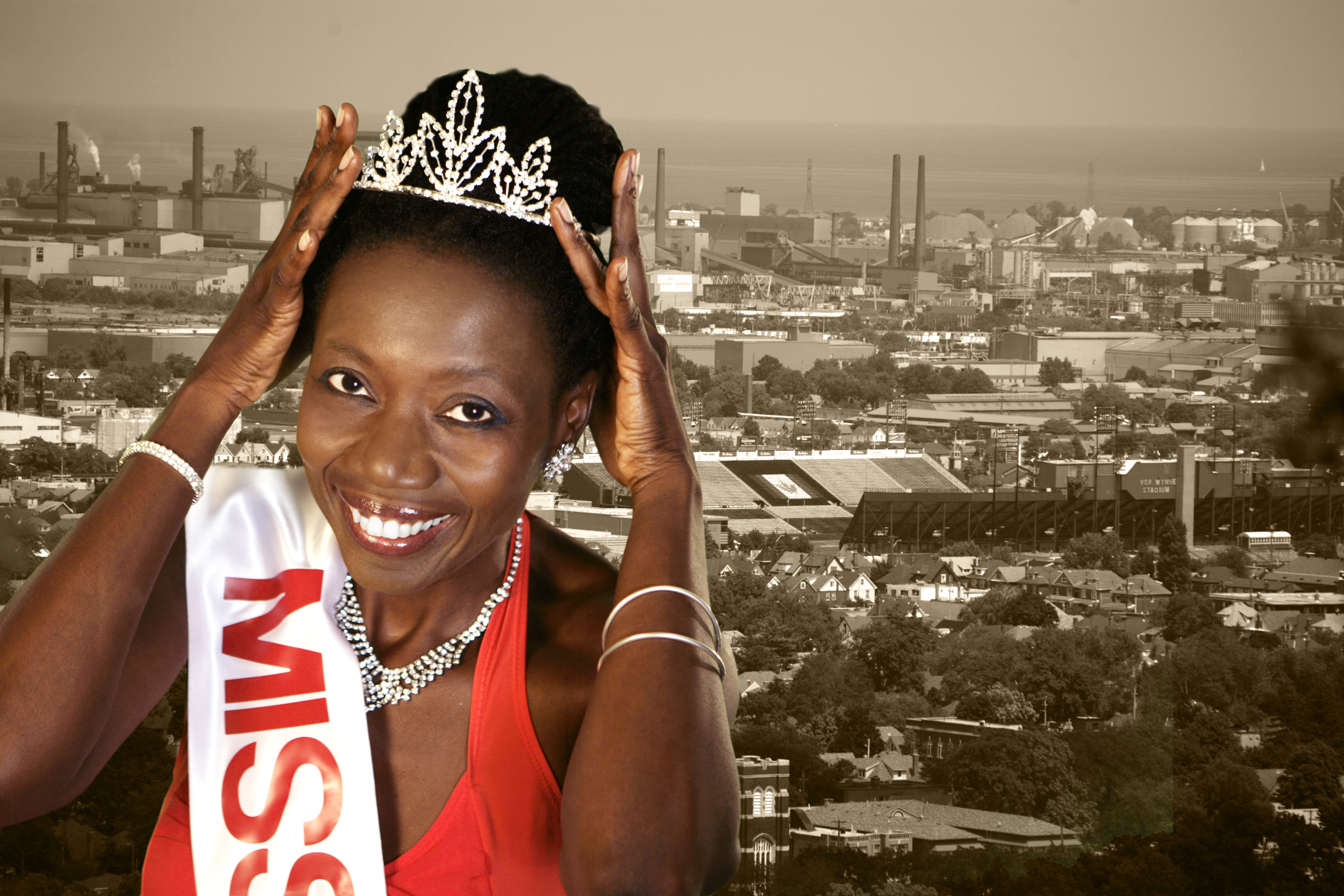
Camille Turner, artist (born 11 March 1960 in Kingston, Jamaica).
Camille Turner’s new media and performance works question Canadian identity and notions of belonging, and interrogate the erasure of Black history from Canadian narratives. Turner is active throughout Canada and internationally, where she regularly performs as her beauty queen alter-ego, Miss Canadiana.
As Miss Canadiana, Turner performs at public events in order to question white beauty standards, and to reassert the presence of Blackness within the story of what it means to be Canadian. Playing with ideas of home and belonging, Turner has also staged a “home-coming” tour, referencing her own relationship to Hamilton, Ontario, as a first generation immigrant. Turner has performed as Miss Canadiana across Canada, as well as in Britain, Germany, Senegal, Australia, Mexico, Cuba and Jamaica.

 Share on Facebook
Share on Facebook Share on X
Share on X Share by Email
Share by Email Share on Google Classroom
Share on Google Classroom
